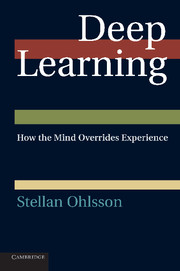6 - The Growth of Competence
Published online by Cambridge University Press: 25 January 2011
Summary
Skilled activity is a programme specifying an objective or terminal state to be achieved, and requiring the serial ordering of a set of constituent, modular subroutines.
Jerome S. BrunerFrom [the] naturalistic viewpoint, it will be possible to show that there are eight kinds of learning, not just one or two.
Robert M. GagnéOn March 18, 1965, the Soviet astronaut Alexei Leonov exited from the airlock on the Voskhod 2 space shuttle and floated in orbit above the Earth for 20 minutes. This was the first space walk and the endpoint of a process that started approximately 200,000 years ago, when members of Homo sapiens migrated out of Africa and into what we now call the Fertile Crescent. The move out of Africa was the beginning of the colonization of Earth by humans. By the middle of the 20th century, the ocean depths and outer space were the only habitats as yet uninhabited.
In the course of this giant dispersal, human beings colonized environments so different from one another that they might as well have been on different planets. South of the Fertile Crescent lies what we now call the Arabian Peninsula, sand dune upon sand dune promising nothing but dehydration and heat stroke between here and the horizon. Yet the ancestors of the Arabs lived successfully there, figuring out how to tame the bad-tempered camel, protect themselves against the sun with layers of cloth and locate what little water there was.
- Type
- Chapter
- Information
- Deep LearningHow the Mind Overrides Experience, pp. 169 - 204Publisher: Cambridge University PressPrint publication year: 2011



